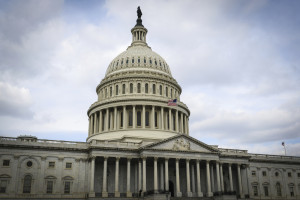
Courts strike down latest version of travel ban, EPA ends “sue and settle” practices, and more…
IN THE NEWS
- Two federal courts—one in Hawaii, and one in Maryland—came down largely against the newest version of President Donald Trump’s travel ban. Issued as a proclamation in late September, the ban would have blocked entry to the United States by citizens of eight countries. Suspending the ban as it applied to six of those countries, the court in Hawaii noted that the ban “lacks sufficient findings that the entry of” individuals from those countries “would be ‘detrimental to the interests of the United States.’” In Maryland, the court halted the ban as it pertains to “individuals with a bona fide relationship with an individual or entity in the United States.”
- The U.S. Environmental Protection Agency (EPA) ended its “sue and settle” practices. Sue and settle policymaking occurs when interest groups sue EPA to force the agency to issue regulations that advance the groups’ interests and EPA settles the lawsuits and acquiesces to the groups’ interests. EPA called this type of behavior “regulation through litigation” and said it creates policy with “little to no public input or transparency.” The Natural Resources Defense Council called sue and settle practices “a non-existent problem.”
- Eighteen attorneys general sued U.S. Secretary of Education Betsy DeVos for not enforcing the Obama-era “Gainful Employment Rule,” which cuts off federal financial aid to colleges that leave students with large amounts of debt and a low likelihood of gainful employment. The attorneys general said that DeVos’s failure to implement the rule “leaves students vulnerable to exploitation and fraud.” A spokesperson for the U.S. Department of Education reportedly called the lawsuits “frivolous” attempts “to score quick political points.”
- President Trump nominated Joseph Simons, a partner at a law firm in Washington, D.C., to be the next chairman of the Federal Trade Commission (FTC). Simons’s confirmation would reportedly fill one of the three vacancies on the FTC.
- The U.S. Food and Drug Administration (FDA) accepted Yescarta, a new drug for cancer patients. The drug, “a cell-based gene therapy,” is, according to FDA Commissioner Scott Gottlieb, “a practical solution to deadly and largely untreatable forms of cancer.” Yescarta may help some patients with non-Hodgkin lymphoma, a cancer of the immune system. The FDA has mandated further study of Yescarta’s effects on patients.
- The Internal Revenue Service (IRS) withdrew an Obama-era proposed regulation that was to prevent the undervaluation of transferred ownership in family-controlled entities. This withdrawal followed a notice outlining eight regulations the IRS put under review pursuant to an April 2017 executive order requiring the identification and reduction of tax regulatory burdens.
- The New York State Department of Financial Services adopted two regulations to protect New Yorkers that would “crack down on unscrupulous practices in the title insurance industry.” The first regulation clarifies what charges can be passed on to policy holders, and the second regulation attempts to prevent affiliate agreements that involve a reward for sending business to the title insurer. Department Superintendent Maria T. Vullo said “New Yorkers can now rest assured that they will know exactly what they are paying for during the closing process.”
- The Federal Communications Commission (FCC) extended by 15 days the comment period for the transfer of control of Tribune Media Company to Sinclair Broadcast Group to allow for a “more efficient review of the proposed transaction.” The FCC has estimated that after this proposed transaction Sinclair would reach 45.5 percent of the national television audience.
- The Federal Energy Regulatory Commission requested comments on its proposed rule that would establish “just and reasonable rates” for wholesale electricity sales to “ensure that certain reliability and resilience attributes of electric generation resources are fully valued.” Comments are due on October 23.
WHAT WE’RE READING THIS WEEK
- A Centre for European Policy Studies (CEPS) report, authored by Andrea Renda, Senior Research Fellow and Head of the Regulatory Policy Unit at CEPS, compared 14 regulatory options when considering the “feasibility” of a European Commission initiative aimed at reducing regulatory costs. Renda found that the European Commission should adopt a “sequential approach,” which suggests “setting reduction targets in selected policy areas” and gradually building “capacity over time.”
- In an article for the New York Times, Christina Caron highlights “safety concerns about unmanned aircraft” after a drone and a passenger plane collided in midair over Quebec City, Quebec last week. Although no injuries resulted, Caron says the incident has brought up “questions about how best to enforce regulations now that drones are becoming more and more commonplace.” After all, as Caron notes, “it’s certainly not the first time a drone has come dangerously close to a plane.”
- In a piece for the magazine Regulation, Sam Batkins, director of strategy and research at Mastercard, and Ike Brannon, a Cato Institute visiting fellow and President of Capital Policy Analytics, argue that the “massive slowdown in regulatory output” is proof that the Trump Administration is “serious about regulatory reform.” However, Batkins and Brannon contend that a “successful deregulatory agenda” would focus on the repeal of existing regulations.



